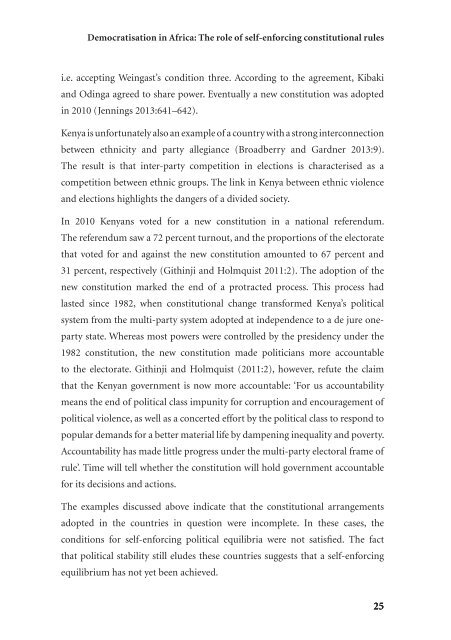ACCORD-ajcr-2015-1
ACCORD-ajcr-2015-1
ACCORD-ajcr-2015-1
- No tags were found...
Create successful ePaper yourself
Turn your PDF publications into a flip-book with our unique Google optimized e-Paper software.
Democratisation in Africa: The role of self-enforcing constitutional rules<br />
i.e. accepting Weingast’s condition three. According to the agreement, Kibaki<br />
and Odinga agreed to share power. Eventually a new constitution was adopted<br />
in 2010 (Jennings 2013:641–642).<br />
Kenya is unfortunately also an example of a country with a strong interconnection<br />
between ethnicity and party allegiance (Broadberry and Gardner 2013:9).<br />
The result is that inter-party competition in elections is characterised as a<br />
competition between ethnic groups. The link in Kenya between ethnic violence<br />
and elections highlights the dangers of a divided society.<br />
In 2010 Kenyans voted for a new constitution in a national referendum.<br />
The referendum saw a 72 percent turnout, and the proportions of the electorate<br />
that voted for and against the new constitution amounted to 67 percent and<br />
31 percent, respectively (Githinji and Holmquist 2011:2). The adoption of the<br />
new constitution marked the end of a protracted process. This process had<br />
lasted since 1982, when constitutional change transformed Kenya’s political<br />
system from the multi-party system adopted at independence to a de jure oneparty<br />
state. Whereas most powers were controlled by the presidency under the<br />
1982 constitution, the new constitution made politicians more accountable<br />
to the electorate. Githinji and Holmquist (2011:2), however, refute the claim<br />
that the Kenyan government is now more accountable: ‘For us accountability<br />
means the end of political class impunity for corruption and encouragement of<br />
political violence, as well as a concerted effort by the political class to respond to<br />
popular demands for a better material life by dampening inequality and poverty.<br />
Accountability has made little progress under the multi-party electoral frame of<br />
rule’. Time will tell whether the constitution will hold government accountable<br />
for its decisions and actions.<br />
The examples discussed above indicate that the constitutional arrangements<br />
adopted in the countries in question were incomplete. In these cases, the<br />
conditions for self-enforcing political equilibria were not satisfied. The fact<br />
that political stability still eludes these countries suggests that a self-enforcing<br />
equilibrium has not yet been achieved.<br />
25


